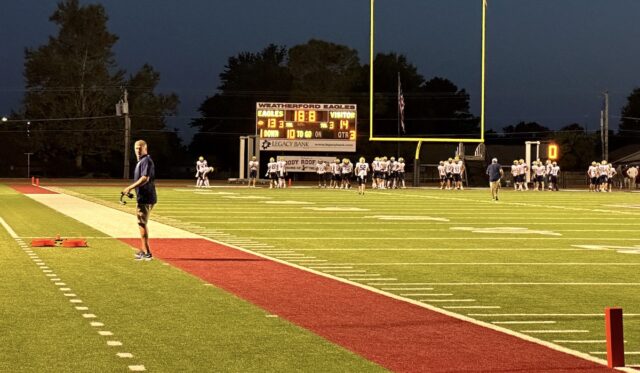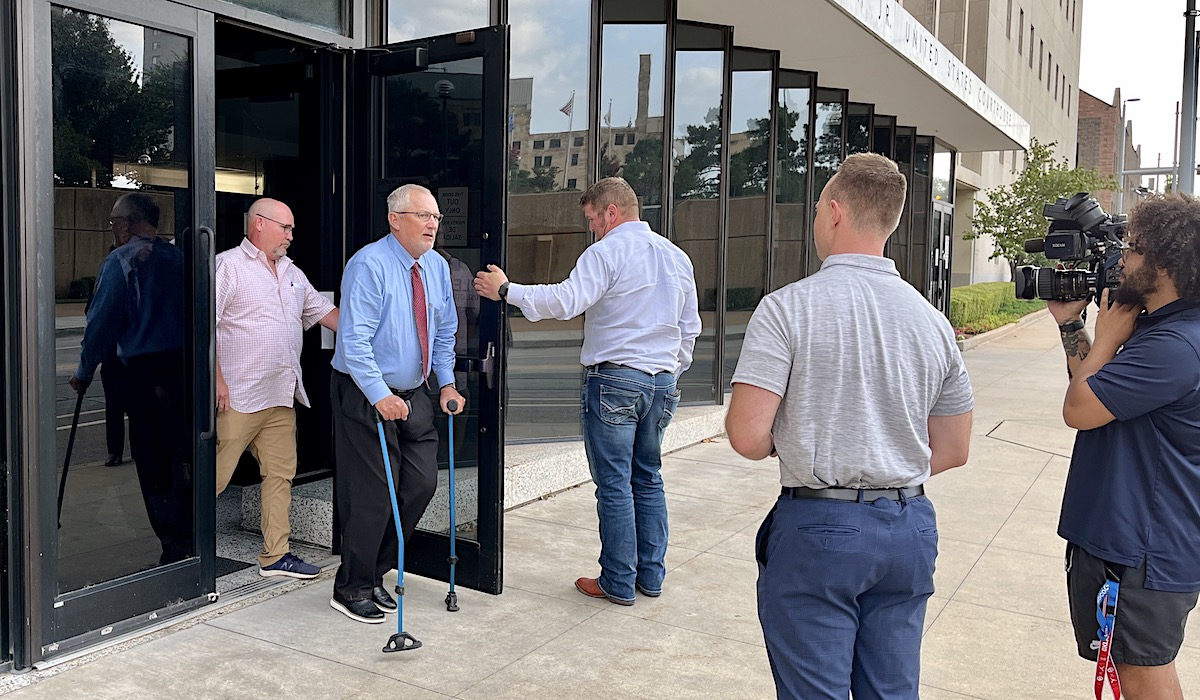

(Update: On Friday, Oct. 13, lawyers for Kingfisher Public Schools and Mason Mecklenburg convened for a hearing to determine the status of the “timeline” document discussed in this story. Federal Judge Charles Goodwin gave Mecklenburg’s lawyers seven days to file — under seal — a supplemental brief demonstrating specific need for the document, and he gave lawyers for KPS seven days after that filing to submit their response. The following article remains in its original form.)
With Mason Mecklenburg’s federal lawsuit against Kingfisher Public Schools and its football coaches scheduled to go to trial in December, the defendants have asked the judge for summary judgments that would dispose of the KPS graduate’s claims without a trial. All parties are expected to attend a hearing Friday after Mecklenburg was accidentally sent a document the district claims is protected and that Mecklenburg’s lawyers say revealed key information the school withheld.
While Judge Charles Goodwin of the U.S. District Court for the Western District of Oklahoma has yet to rule on the motions for summary judgment, he did set a hearing for Oct. 13 after Mecklenburg’s lawyers filed an initial motion to show cause regarding a document they inadvertently received that Kingfisher Public Schools says should be kept private.
The document is referred to in court filings as “the Timeline,” and it purportedly depicts a log of events related to a portion of Mecklenburg’s time with the Kingfisher football program, which he alleges perpetuated a culture of hazing and abuse that amounted to “torture.”
“Recent discovery has shown that KPS intentionally misled the court regarding the origin of the timeline as well as the dissemination of the timeline to third parties, and withheld information that is fatal to their position,” Mecklenburg’s attorneys wrote Sept. 28.
According to court documents, the timeline was created by former KPS Superintendent Daniel Craig and contains his contemporaneous handwritten notes. It was turned over to the Oklahoma State Bureau of Investigation earlier this year, but the exact manner of how the OSBI ended up with the document is at the center of the document dispute.
The district alleges that the timeline should have been withheld from the plaintiff because it is protected by both attorney-client privilege and work-product doctrine. In an order dated Aug. 29, Goodwin denied that the document was protected by attorney-client privilege but affirmed that it is protected by work-product doctrine.
Analogous to attorney-client privilege, the work-product doctrine protects documents and other tangible things created by a party or its representative in anticipation of litigation. Because the district said the timeline was created as a result of Mecklenburg’s lawsuit, Goodwin held that the timeline fell under the work-product doctrine.
Despite the ruling regarding the timeline, Mecklenburg’s lawyers were still allowed to serve a subpoena to OSBI for other relevant information. When the agency sent the requested documents over, it accidentally included the timeline document.
Upon reviewing the timeline, Mecklenburg’s attorneys realized that the district’s lawyers had shared aspects of the document with OSBI in March 2023, a non-party disclosure that they argue waives the protections of work-product doctrine. The district had previously held that the document was given to OSBI by Craig only in February 2023. Because Craig was a former employee at that time, the district has argued that he had no authority to waive the district’s work-product protection, an argument with which the court agreed.
However, Mecklenburg’s lawyers argue that because the district’s lawyers also shared parts of the document with the OSBI in March 2023, the district waived the work-product protection at that.
Meanwhile, a supplement to the initial motion filed Oct. 5 by Mecklenburg’s attorneys complicates their argument regarding the timeline. Mecklenburg said his attorneys were alerted Oct. 4 that the district sent Craig’s handwritten notes to OSBI in March instead of the full timeline. Because of the new information, Mecklenburg is no longer asking the district to show cause for withholding information from the court, but he is still asking for the court to rule the timeline is not protected information.
“Simply typing up [Craig’s] notes doesn’t cloak them with work-product protection,” the lawyers wrote in their supplemental filing. “If the timeline was work product, the privilege was waived by disclosure of portions of the incomplete notes upon which it is based.”
The defendants, for their part, argue that the motion to produce the timeline is simply asking the court to reconsider a closed matter after it already ruled that the timeline was protected by work-product doctrine. They also accused Mecklenburg’s lawyers of agreeing to delete the accidentally sent timeline without actually doing so.
Goodwin is expected to rule on Mecklenburg’s motion regarding the timeline information during or after Friday’s hearing. Barring a settlement agreement or Goodwin granting summary judgment, a jury trial is set to begin Dec. 5.
Supreme Court hearing for ‘extraordinary relief’
In a separate case related to the same allegations, lawyers for the Mecklenburgs, Kingfisher Public Schools, KPS head football coach Jeff Myers, the State Department of Education and the State Board of Education made arguments Tuesday before a referee of the Oklahoma Supreme Court.
The hearing centered on an Aug. 28 request for a writ of mandamus filed by Mason Mecklenburg’s parents, Justin and Lyndy, which asks the court to compel the KPS administration to begin the process of disciplining or firing Myers.
RELATED
Facing December trial in football hazing lawsuit, Kingfisher School Board meets in court by Bennett Brinkman & Tres Savage
If the district cannot take that action, the Mecklenburgs further ask in their petition that the court compel the State Board of Education to take control of the district, install a new superintendent, and begin the process of terminating Myers.
With Justin and Lyndy Mecklenburg nodding their agreement in the gallery of the courtroom, attorney Nathan Hall argued in front of Supreme Court referee Kyle Rogers that the court should grant this “extraordinary relief” because evidence is clear that Myers’ presence perpetuates harm for Kingfisher students. State statute requires schools to keep students safe, he said.
“The law is pretty clear that when you have evidence of abuse in schools that school districts are required to take disciplinary action, and the reason for that is clear — it’s to protect our kids,” Hall told reporters after the hearing, summarizing the argument he made in the courtroom. “And so, the school board won’t do anything, (State Superintendent) Ryan Walters won’t do anything, and so we went to the one place where we think you can actually get the law to be enforced and that’s the Oklahoma Supreme Court.”
Lawyers on the other side argued that the firing of Myers is a matter of local control, and they disputed the claim that Myers is causing harm to students. Myers’ lawyer, Joe White, called the petition “frivolous” and a “ploy for media coverage.”
“All they’ve done is stand up here and argue facts that we’ve got answers to. We’re waiting for our day in court down the street in front of Judge Charles Goodwin. This matter is playing out as it should down the street in federal court,” White said. “Petitioners’ filing of this application for mandamus writ is clearly just a ploy for media coverage.
“This type of behavior should not only not be condoned by this court, but it should be made to be an example of how this court responds when its jurisdiction is improperly requested with no good-faith basis in law. It’s time wasted. It’s money wasted, and it’s docket crowding with frivolous filings.”
Defendants seek summary judgment, conclusion of case

Beyond the timeline document issue in federal court, the defendants have also asked the judge to avoid the December trial altogether and issue a summary judgement on the case.
The defendants — which include the district, Myers, assistant coach Derek Patterson, and former assistant coaches Blake Eaton and Micah Nall — argue that the facts of the case are not in dispute and do not represent negligence on their part.
But in responding to the defendants’ motions for summary judgment, new filings from Mason Mecklenburg have revealed more alleged abuse within the high school’s storied football program.
In affidavits filed Sept. 20, a former member of the Kingfisher football team and the mother of a different former player said the program caused harm.
“Many of us, including myself, endured abuse from the coaches,” wrote Clayton Abercrombie in an affidavit. “Many of us, including myself, endured abuse from upperclassman football players.”
Abercrombie played for the Kingfisher High School football team from 2016 to 2020.
Erin Richardson Delozier, the mother of a 2023 KPS graduate and former football player, also authored an affidavit alleging misconduct by Myers.
“My son used to be the sweetest, kindest person. What Coach Myers subjected my son to has made [him] an angry and withdrawn young man,” Richardson wrote. “He does not want to talk about what happened to him in the football program. I am worried that there is much more that occurred than I even know about and that there will be horrible consequences in [his] future.”
Delozier wrote that Myers constantly made fun of her son and that the district administration declined to address the issue when she went to media and the local school board with her complaints.
“During [his] freshman year, he told me how Coach Jeff Myers humiliated him and made fun of him,” Delozier said. “That Coach Myers would come up behind [him] when he was lifting weights and Coach Myers would then reach between [his] arms and play with [his] breast and nipples with both his hands. That Coach Myers would encourage other players to cup [his] breast and pinch his nipples in the same way. [He] hated these physical and personal violations. Despite asking Coach Myers to stop, Coach Myers never did.”
For Goodwin to grant a defense motion for summary judgment, he would need to conclude there is no genuine dispute regarding material facts and that Mecklenburg’s claims fail as a matter of law and that a trial is unnecessary.




















